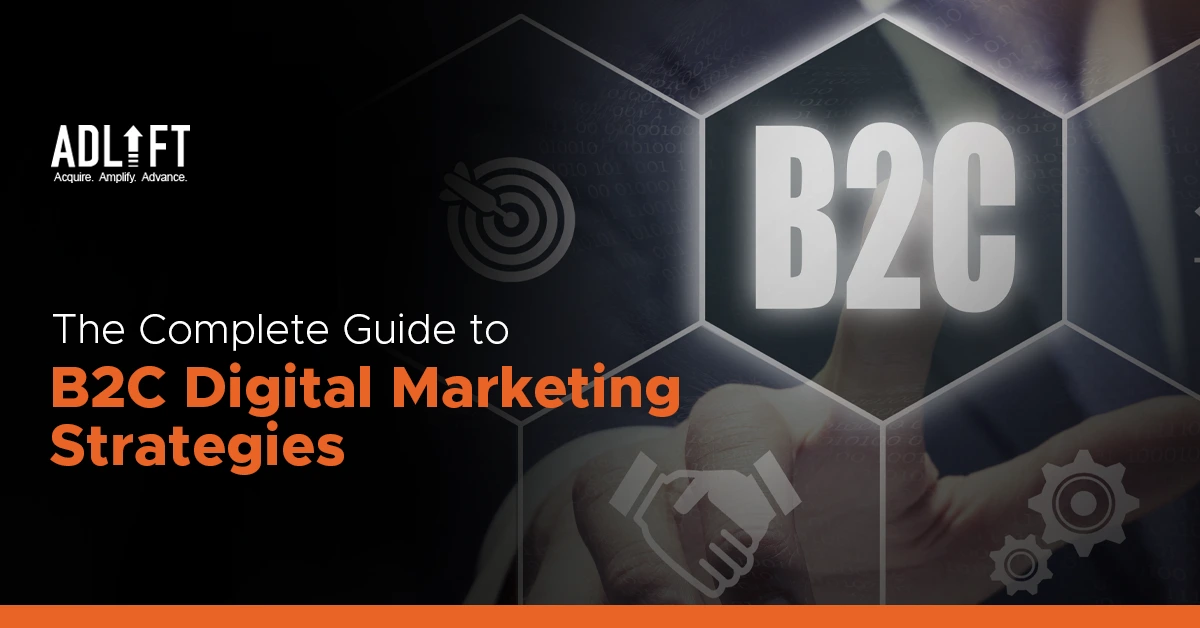The Complete Guide to B2C Digital Marketing Strategies

In the digital age, B2C (Business-to-Consumer) companies must have effective digital marketing strategies, including B2C content marketing, to connect with and engage their target audience. With a plethora of online channels and platforms available, it’s crucial for businesses to understand and leverage the right B2C marketing strategies to reach their customers. This comprehensive guide will explore key B2C digital marketing strategies and provide actionable insights to help businesses thrive in the digital landscape.
Define Your Target Audience:
In the realm of B2C content marketing, understanding your target audience is the bedrock of a triumphant B2C strategy. To achieve this, delve into customer data, conduct thorough market research, and consider crucial factors like demographics, interests, and pain points. Armed with this invaluable information, you can craft personalized messages and campaigns that strike a chord with your audience, leading to enhanced engagement and successful outcomes.
Build a User-Friendly Website:
Your website works as the online face of your business and plays a pivotal role in your B2C marketing strategies. Ensure it provides a seamless user experience across devices, loads quickly, and is visually appealing. Incorporate persuasive copy, captivating visuals, and intuitive navigation to engage your audience effectively. Use SEO techniques to enhance visibility in search engine results and attract traffic to your website.
Leverage Social Media Marketing:
Social media platforms are invaluable for B2C businesses to connect with their audience and optimize product pages. Find the platforms where your target audience is more active and establish a strong presence there. Engage with your audience with the use of relevant content, including posts, images, videos, and stories. Encourage user-generated content, respond to comments and messages, and build a community around your brand. Additionally, optimize your product pages on social media platforms to showcase your offerings effectively and drive conversions.
Embrace Influencer Marketing:
Influencer marketing, including optimizing product pages, has gained tremendous popularity in recent years. Get in touch with influencers who align with your brand and have a substantial following in your target market. Influencers can create authentic and engaging content that promotes your products or services, optimizing product pages for maximum impact. Their influence and credibility can significantly impact brand awareness, drive website traffic, and generate conversions.
Implement Email Marketing Campaigns:
Email marketing, including B2C SEO, remains a powerful tool for nurturing customer relationships and driving conversions. Build a subscriber list by offering valuable content, incentives, or exclusive promotions, optimizing for B2C SEO. Divide your audience based on their choices and behaviors to deliver personalized emails. Use automation to send triggered emails, such as welcome messages, abandoned cart reminders, and post-purchase follow-ups. Monitor key metrics, such as open rates and click-through rates, to measure campaign effectiveness in both email marketing and B2C SEO efforts.
Invest in Paid Advertising:
Paid advertising, an integral part of B2C marketing strategies, enables you to reach a broader audience and boost brand visibility. Consider platforms like Google Ads, social media advertising, and display advertising to effectively reach your target audience. Use targeting options to narrow down and reach your specific audience, optimizing your ads for better performance in your B2C marketing strategies. Monitor crucial metrics like impressions, click-through rates, and conversions to measure the return on investment (ROI) of your ad campaigns and refine your approach accordingly.
Create Engaging Content:
Content marketing is essential for establishing thought leadership and building brand trust as part of your B2C strategy. Develop a content plan that works with your audience’s interests and pain points, ensuring it is tailored to your B2C strategy. Create and distribute valuable content through blog posts, articles, videos, podcasts, infographics, and more to engage and educate your target audience. Optimize the content for search engines to improve visibility and increase traffic to your website. Additionally, share your content across relevant platforms and leverage social media channels to expand your reach and amplify your B2C strategy.
Prioritize Mobile Optimization:
Content marketing, including B2C SEO, is essential for establishing thought leadership and building brand trust. Develop a content strategy that aligns with your audience’s interests and pain points, optimizing it for search engines as part of your B2C SEO efforts. Create and distribute valuable content through blog posts, articles, videos, podcasts, infographics, and more. Optimize content for search engines to improve visibility, increase organic traffic, and enhance your B2C SEO strategy. Additionally, share your optimized content across relevant platforms to expand your reach.
As mobile usage continues to rise, optimizing your digital marketing strategies for mobile devices is crucial in your B2C strategy. Ensure your website, emails, and digital assets are mobile-responsive for a seamless user experience. Mobile optimization plays a vital role in B2C SEO, as it improves engagement, reduces bounce rates, and ultimately leads to higher conversions. Consider mobile-specific advertising formats, such as mobile app ads and in-app advertising, to effectively reach your target audience on mobile platforms.
Monitor, Analyze, and Adapt:
Regularly monitor and analyze your digital marketing efforts to identify areas for improvement. Use web analytics tools to track metrics such as website traffic, conversion rates, and engagement levels. Analyze the data to understand customer behavior, identify successful strategies, and optimize underperforming ones. Stay up to date with industry trends and be adaptable in your approach to stay ahead of the competition.
Conclusion
To achieve success in B2C digital marketing, including B2C content marketing, it is crucial to understand your target audience, utilize multiple channels effectively, and continuously analyze and adapt your approach. By implementing these strategies, businesses can forge connections with their customers, foster brand loyalty, and propel revenue growth in the ever-evolving digital landscape. Keeping the customer at the center, delivering value through B2C content marketing, and consistently refining strategies will pave the route for long-term success in B2C digital marketing.
Categories
Recent Posts
- Boost Your Website’s Visibility with These Must-have B2B SEO Tools January 13, 2025
- Master Your Digital Strategy: Learn the 7 Types of SEO That Lead to High Rankings January 13, 2025
- How to integrate your SEO and paid search strategies to maximize efficiency and reduce CAC January 6, 2025
- SEO in 2025: Adapting to a Changing Search Landscape By Prashant Puri, CEO & Co-Founder, AdLift January 3, 2025
- Understanding the Google December 2024 Spam Update: What You Need to Know December 31, 2024
- Dermatology Marketing Made Easy: Proven Techniques to Grow Your Client Base December 30, 2024
- Facebook vs Twitter: Which Platform Wins for Your Marketing Goals? December 30, 2024
- Discover the Top Digital Marketing Strategies for 2025 December 30, 2024
- The Art of Naming Conventions in Marketing Campaigns: Best Practices for Clarity and Success December 30, 2024
- 2024 Google Search Trends in the United States: What Captured Our Attention This Year? December 24, 2024
Get
in Touch
Contact AdLift for a 360-degree marketing plan


